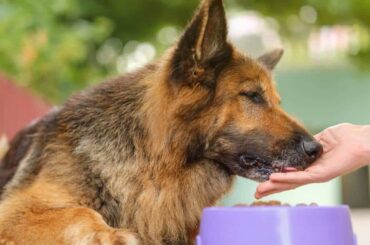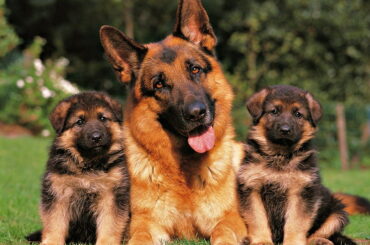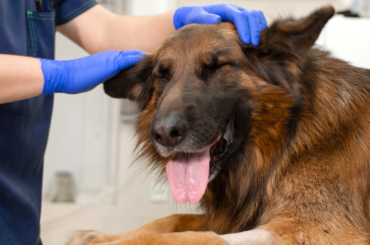Managing your German Shepherd’s weight is crucial for their overall health and well-being. Maintaining an optimal weight helps prevent various health issues, including joint problems, heart conditions, and diabetes. Here are practical tips to help you manage your German Shepherd’s weight effectively:
- Regular Veterinary Check-ups:
- Schedule regular check-ups with your veterinarian to monitor your German Shepherd’s weight and overall health. Your vet can provide guidance on the appropriate weight range for your dog’s age, breed, and size.
- Balanced Diet:
- Choose a high-quality dog food formulated for large or active breeds. Look for options that provide a balanced mix of proteins, fats, carbohydrates, vitamins, and minerals. Avoid excessive treats and table scraps, as these can contribute to weight gain.
- Portion Control:
- Measure your dog’s food portions carefully to avoid overfeeding. Follow the recommended feeding guidelines on the dog food packaging, and adjust portions based on your dog’s weight, age, and activity level.
- Avoid Free Feeding:
- Instead of leaving food out for your German Shepherd to eat at will (free feeding), establish a regular feeding schedule. This helps regulate their metabolism and prevents overeating.
- Use Low-Calorie Treats:
- If you use treats for training or as rewards, choose low-calorie options. You can also break larger treats into smaller pieces to reduce the overall calorie intake.
- Monitor Treats and Snacks:
- Be mindful of treats and snacks from various sources, including well-meaning family members. Educate others about your dog’s dietary needs and ask them to avoid giving extra treats.
- Provide Regular Exercise:
- Regular exercise is crucial for weight management. Engage your German Shepherd in daily walks, play sessions, or other forms of physical activity. Adjust the intensity and duration based on your dog’s age, fitness level, and health status.
- Interactive Toys and Puzzle Feeders:

- Use interactive toys and puzzle feeders to make mealtime more engaging. This not only provides mental stimulation but also slows down the eating process, giving your dog a sense of fullness.
- Monitor Body Condition:
- Regularly assess your German Shepherd’s body condition by feeling their ribs. You should be able to feel the ribs easily without excessive fat covering them. If you notice weight gain, adjust their diet and exercise routine accordingly.
- Weight-Loss Diets and Consultation:
- If your German Shepherd is overweight, consult with your veterinarian to develop a tailored weight-loss plan. Your vet may recommend a specialized weight-loss diet and provide guidance on adjusting portions.
- Hydration:
- Ensure your dog has access to fresh water at all times. Proper hydration supports overall health and can contribute to a feeling of fullness, preventing overeating.
- Weight-Loss Journal:
- Keep a journal to track your German Shepherd’s weight, diet, and exercise routine. This helps you identify patterns and adjust their lifestyle as needed.
- Monitor Health Conditions:
- Some health conditions, such as hypothyroidism, can contribute to weight gain. If you suspect an underlying health issue, consult with your veterinarian for proper diagnosis and treatment.
Remember that weight management is a gradual process, and crash diets are not recommended. Sudden changes in diet or exercise can lead to health issues.
Consistency, patience, and a holistic approach to your German Shepherd’s well-being are key to achieving and maintaining a healthy weight. Always seek guidance from your veterinarian for personalized advice based on your dog’s specific needs.






